Aztofa XR 11 mg Tablet 10's
MRP ₹890.5
(Inclusive of all Taxes)
₹133.6 Cashback (15%)
Provide Delivery Location
Online payment accepted
 Prescription drug
Prescription drugWhats That
Composition :
Manufacturer/Marketer :
Consume Type :
Expires on or after :
Return Policy :
About Aztofa XR 11 mg Tablet
Aztofa XR 11 mg Tablet belongs to a group of medicines called Janus kinase inhibitors used to treat rheumatoid arthritis, psoriatic arthritis, and ulcerative colitis. Rheumatoid arthritis is an auto-immune disease (the body's immune system attacks its tissue) which leads to joint pain and damage. Psoriatic arthritis is an inflammatory condition of the joints, often associated with psoriasis. Ulcerative colitis is an inflammatory disease of the large intestine.
Aztofa XR 11 mg Tablet contains 'Tofacitinib' which works by blocking the Janus kinase enzyme, thereby lowering inflammation and symptoms associated with rheumatoid and psoriatic arthritis.
In some cases, you may experience common side-effects such as diarrhoea, headache, upper respiratory tract infection, cold, nausea, and vomiting. Most of these side effects do not require medical attention and will resolve gradually over time. However, you are advised to talk to your doctor if you experience these side effects persistently.
Inform your doctor if you have an active infection, if you have a condition that increases the chance of having infections, if you are taking immunosuppressants, medicines that affect the immune system or corticosteroids. Avoid taking Aztofa XR 11 mg Tablet if you are pregnant or breastfeeding. Aztofa XR 11 mg Tablet is not recommended for children below 18 years as safety and effectiveness have not been established. Keep your doctor informed about your health condition and medicines to rule out any side effects.
Uses of Aztofa XR 11 mg Tablet
Directions for Use
Key Benefits
Aztofa XR 11 mg Tablet belongs to a group of medicines called Janus kinase inhibitors used to treat rheumatoid arthritis, psoriatic arthritis, and ulcerative colitis. Aztofa XR 11 mg Tablet works by blocking Janus kinase enzyme, thereby lowering inflammation and symptoms associated with rheumatoid and psoriatic arthritis. Aztofa XR 11 mg Tablet is indicated for patients with moderate to severe rheumatic arthritis, and psoriatic arthritis who have had intolerance or inadequate response to methotrexate or DMARDs (Disease-Modifying Anti-Rheumatic Drugs).
Storage
- Preventing Vomiting (Before it Happens)
- Take medication exactly as prescribed by your doctor. This can help minimize side effects, including vomiting.
- Having a small meal before taking your medication can help reduce nausea and vomiting.
- Talk to your doctor about taking anti-nausea medication along with your prescribed medication.
- Managing Vomiting (If it Happens)
- Try taking ginger in the form of tea, ale, or candy to help alleviate nausea and vomiting.
- What to Do if Vomiting Persists
- Consult your doctor if vomiting continues or worsens, consult the doctor for guidance on adjusting your medication or additional treatment.
- Keep your skin clean by gently washing your face two times daily and after sweating. Choose a mild and non-abrasive cleanser.
- Use gentle alcohol-free skin care products. Avoid products that might irritate your skin such as exfoliants, astringents and toners.
- Acne may also occur due to oil in the hair. Thus, if you have oily hair, shampoo more frequently than you do now and keep your hair away from face.
- Keep your hands off your face as touching face throughout the day might worsen acne. Also, do not pick, squeeze or pop acne as it will prolong the healing process and increase the risk of dark spots and scarring.
- Avoid tanning by applying a broad spectrum sunscreen and wearing sun-protective clothing when outdoors.
- Inform Your Doctor: Notify your doctor immediately about your diarrhoea symptoms. This allows them to adjust your medication or provide guidance on managing side effects.
- Stay Hydrated: Drink plenty of fluids to replace lost water and electrolytes. Choose water, clear broth, and electrolyte-rich drinks. Avoid carbonated or caffeinated beverages to effectively rehydrate your body.
- Follow a Bland Diet: Eat easy-to-digest foods to help firm up your stool and settle your stomach. Try incorporating bananas, rice, applesauce, toast, plain crackers, and boiled vegetables into your diet.
- Avoid Trigger Foods: Steer clear of foods that can worsen diarrhoea, such as spicy, fatty, or greasy foods, high-fibre foods, and dairy products (especially if you're lactose intolerant).
- Practice Good Hygiene: Maintain good hygiene to prevent the spread of infection. To stay healthy, wash your hands frequently, clean and disinfect surfaces regularly, and avoid exchanging personal belongings with others.
- Take Anti-Diarrheal Medications: If your doctor advises, anti-diarrheal medications such as loperamide might help manage diarrhoea symptoms. Always follow your doctor's directions.
- Keep track of your diarrhoea symptoms. If they don't get better or worse or are accompanied by severe stomach pain, blood, or dehydration signs (like extreme thirst or dark urine), seek medical help.
- Take medications with food (if recommended): It can help prevent stomach distress and indigestion.
- Eat smaller, more frequent meals: Divide daily food intake into smaller, more frequent meals to ease digestion.
- Avoid trigger foods: Identify and avoid foods that trigger indigestion, such as spicy, fatty, or acidic foods.
- Stay upright after eating: Sit or stand upright for at least 1-2 hours after eating to prevent stomach acid from flowing into the oesophagus.
- Avoid carbonated drinks: Avoid drinking carbonated beverages, such as soda or beer, which can worsen indigestion.
- Manage stress: To alleviate indigestion, engage in stress-reducing activities like deep breathing exercises or meditation.
- Consult a doctor if needed: If indigestion worsens or persists, consult a healthcare professional to adjust the medication regimen or explore alternative treatments.
- Inform your doctor about the nausea and discuss possible alternatives to the medication or adjustments to the dosage.
- Divide your daily food intake into smaller, more frequent meals to reduce nausea.
- Opt for bland, easily digestible foods like crackers, toast, plain rice, bananas, and applesauce.
- Avoid certain foods that can trigger nausea, such as fatty, greasy, spicy, and smelly foods.
- Drink plenty of fluids, such as water, clear broth, or electrolyte-rich beverages like coconut water or sports drinks.
- Use ginger (tea, ale, or candies) to help relieve nausea.
- Get adequate rest and also avoid strenuous activities that can worsen nausea.
- Talk to your doctor about taking anti-nausea medication if your nausea is severe.
- Record when your nausea occurs, what triggers it, and what provides relief to help you identify patterns and manage your symptoms more effectively.
- Inform your doctor about your constipation symptoms. They may adjust your medication or advise alternative treatments.
- Stay hydrated by drinking sufficient of water (at least 8-10 glasses a day) to help soften stool and promote bowel movements.
- Increase fibre intake by eating foods high in fibre, such as fruits, whole grains, vegetables and legumes, to help bulk up the stool.
- Establish a bowel routine by trying to go to the bathroom at the same time each day to train your bowels.
- Engaging in regular exercise, like walking or yoga, can support in bowel movement stimulation.
- Consult your doctor if constipation persists, and discuss alternative treatments or adjustments to your medication.
Drug Warnings
Do not take Aztofa XR 11 mg Tablet if you are allergic to any of its components; if you have a severe infection, bloodstream infection, active tuberculosis, or if you have severe liver problems such as cirrhosis. Avoid taking Aztofa XR 11 mg Tablet if you are pregnant or breastfeeding. Inform your doctor if you have an infection, symptoms of infection, a condition that increases chances of infection, are taking any medicines that affect the immune system; have or had a history of tuberculosis, or were in close contact with someone who has/had tuberculosis; chronic lung disease, liver problems, hepatitis B/C, cancer, are at a high risk of developing skin cancer, inflammation/ulcers of the large intestine, kidney problems, planning to get vaccinated, heart problems, high cholesterol, high blood pressure, heart attack, diabetes, or blood clotting problems. If your white blood cell count or red blood cell count is low, avoid taking Aztofa XR 11 mg Tablet . Aztofa XR 11 mg Tablet is not recommended for children below 18 years as safety and effectiveness have not been established. Keep your doctor informed about your health condition and medicines to rule out any side effects.
Drug-Drug Interactions
Drug-Drug Interactions
Login/Sign Up
Taking Aztofa XR 11 mg Tablet with atazanavir may increase the blood levels of Aztofa XR 11 mg Tablet. This may lead to cause severe infections.
How to manage the interaction:
Co-administration of Aztofa XR 11 mg Tablet with Atazanavir can possibly result in an interaction, but it can be taken if your doctor has advised it. However consult your doctor if you experience fatigue, dizziness, fainting, fever, chills, diarrhea, sore throat, muscle aches, shortness of breath, weight loss, red or inflamed skin, body sores, and pain or burning during urination. Do not stop using any medications without talking to your doctor.
When Aztofa XR 11 mg Tablet is taken with Nelfinavir, that may increase the risk of side effects.
How to manage the interaction:
Although taking Aztofa XR 11 mg Tablet and Nelfinavir together can evidently cause an interaction, it can be taken if your doctor has suggested it. Do not stop using any medications without a doctor's advice.
Using Aztofa XR 11 mg Tablet together with antithymocyte globulin can increase the risk of serious infections.
How to manage the interaction:
Taking Antithymocyte Globulin with Aztofa XR 11 mg Tablet together can possibly result in an interaction, but it can be taken if your doctor has advised it. However, if you experience fever, chills, diarrhea, sore throat, muscle aches, shortness of breath, weight loss, pain or burning during urination contact your doctor. Do not discontinue any medications without consulting your doctor.
Using Aztofa XR 11 mg Tablet together with abatacept can increase the risk of serious infections.
How to manage the interaction:
Taking Abatacept with Aztofa XR 11 mg Tablet together can possibly result in an interaction, but it can be taken if your doctor has advised it. However, if you experience fever, chills, sore throat, muscle aches, or difficulty breathing, contact your doctor immediately. Do not stop using any medications without a doctor's advice.
Coadministration of Ketoconazole and Aztofa XR 11 mg Tablet may increase the blood levels and effects of Aztofa XR 11 mg Tablet which may lead to side effects (low blood cell counts, anemia, serious infections, and elevated blood lipid levels).
How to manage the interaction:
Although taking Ketoconazole and Aztofa XR 11 mg Tablet together can result in an interaction, it can be taken if a doctor has prescribed it. However, if you experience symptoms like paleness, exhaustion, dizziness, fainting, fever, chills, diarrhea, sore throat, muscular pains, shortness of breath, blood in the phlegm, weight loss, red or irritated skin, body sores, or discomfort or burning when urinating, consult a doctor. Do not stop using any medications without a doctor's advice.
Using Aztofa XR 11 mg Tablet together with bendamustine may increase the risk of developing serious infections.
How to manage the interaction:
Taking Aztofa XR 11 mg Tablet with Bendamustine together can possibly result in an interaction, but it can be taken if your doctor has advised it. However, if you experience fever, chills, diarrhea, sore throat, muscle aches, shortness of breath, blood in phlegm, weight loss, red or inflamed skin, body sores, and pain or burning during urination contact your doctor immediately. Do not discontinue any medications without consulting a doctor.
Taking Aztofa XR 11 mg Tablet with Pemetrexed may increase the risk of infection.
How to manage the interaction:
Although there is a possible interaction between Pemetrexed and Aztofa XR 11 mg Tablet, you can take these medicines together if prescribed by your doctor. However, consult the doctor immediately if you experience symptoms such as fever, chills, diarrhea, sore throat, muscle aches, shortness of breath, blood in phlegm, weight loss, red or inflamed skin, body sores, and pain or burning during urination. Do not discontinue any medications without first consulting your doctor.
Taking Imatinib and Aztofa XR 11 mg Tablet can increase the risk of developing serious infections.
How to manage the interaction:
Although there is an interaction, Imatinib can be taken with Aztofa XR 11 mg Tablet if prescribed by the doctor. However, if you experience fever, chills, diarrhea, sore throat, muscle aches, shortness of breath, blood in your coughing fluid, weight loss, red or irritated skin, body sores, and discomfort or burning when you urinate, consult a doctor. Do not stop using any medications without consulting a doctor.
Taking Aztofa XR 11 mg Tablet with phenobarbital, may decrease Aztofa XR 11 mg Tablet blood levels and effects.
How to manage the interaction:
Although taking phenobarbital and Aztofa XR 11 mg Tablet together can result in an interaction, it can be taken if a doctor has prescribed it. Do not stop using any medications without a doctor's advice.
Taking Aztofa XR 11 mg Tablet with Temsirolimus may increase the risk of infection.
How to manage the interaction:
Although there is a possible interaction between Aztofa XR 11 mg Tablet and Temsirolimus, you can take these medicines together if prescribed by your doctor. However, consult the doctor immediately if you experience symptoms such as fever, chills, diarrhea, sore throat, muscle aches, shortness of breath, blood in phlegm, weight loss, red or inflamed skin, body sores, and pain or burning during urination. Do not discontinue any medications without consulting your doctor.
Drug-Food Interactions
Drug-Food Interactions
Login/Sign Up
Diet & Lifestyle Advise
- Physical activity helps in strengthening muscles and relieves joint stiffness. Gentle activities like 20-30minutes of walking or swimming would be helpful.
- Performing yoga may also help in improving joint flexibility and pain management.
- Maintain a healthy weight by performing regular low-strain exercises and eating healthy food.
- Get adequate sleep, as resting the muscles can help in reducing inflammation and swelling.
- De-stress yourself by meditating, reading books, taking a warm bubble bath or listening to soothing music.
- Acupuncture, massage and physical therapy may also be helpful.
- Eat food rich in antioxidants such as berries, spinach, kidney beans, dark chocolate, etc.
- Foods containing flavonoids help in reducing inflammation. These include soy, berries, broccoli, grapes and green tea.
- Avoid smoking and alcohol consumption.
Side Effects of Aztofa XR 11 mg Tablet
- Headache
- Diarrhoea
- Vomiting
- Nausea
- Upper respiratory tract infection
- Cold
- High blood pressure
Habit Forming
Therapeutic Class
All Substitutes & Brand Comparisons
RX
Tobraza XR Tablet 10's
Glenmark Pharmaceuticals Ltd
₹206
(₹18.54 per unit)
76% CHEAPERRX
Tofasure XR Tablet 10's
Canixa Life Sciences Pvt Ltd
₹262.5
(₹23.63 per unit)
70% CHEAPERRX
Tofajak-IN XR 11 mg Tablet 10's
Cipla Ltd
₹309
(₹27.81 per unit)
65% CHEAPER
Author Details
We provide you with authentic, trustworthy and relevant information
Drug-Diseases Interactions
Drug-Diseases Interactions
Login/Sign Up
FAQs
Aztofa XR 11 mg Tablet works by blocking Janus kinase enzyme, thereby lowers inflammation and symptoms associated with rheumatoid and psoriatic arthritis.
Hypertension/high blood pressure could be a side-effect of Aztofa XR 11 mg Tablet . Consult your doctor before taking Aztofa XR 11 mg Tablet if you have high blood pressure or if you are taking anti-hypertensive medicines.
Diarrhoea might be a side-effect of Aztofa XR 11 mg Tablet . Eat non-spicy meals and drink plenty of fluids to prevent dehydration if you experience diarrhoea. If you find blood in stools (tarry stools) or if you experience severe diarrhoea, consult your doctor. Do not take anti-diarrheal medicine on your own.
Aztofa XR 11 mg Tablet might impair fertility in females of reproductive potential. It is not known if the effect is reversible. Therefore, talk to a doctor before starting Aztofa XR 11 mg Tablet if you are trying to become pregnant or if you have any concerns regarding this.
Aztofa XR 11 mg Tablet affects the immune system and might lower the ability of the immune system to fight infections. Inform your doctor if you have an active infection, if you have a condition that increases the chance of having infections, if you are taking immunosuppressants, medicines that affect the immune system or corticosteroids.
Drug-Drug Interactions Checker List
- RIFAMPICIN
- FLUCONAZOLE
- KETOCONAZOLE
- AZATHIOPRINE
- MERCAPTOPURINE
- CYCLOSPORINE
- TACROLIMUS
- PREDNISONE
Special Advise
- Your doctor may advise you to get a blood test done before starting treatment with Aztofa XR 11 mg Tablet , after 4-8weeks of treatment and then every three months to determine your blood cell count.
- Your doctor might advise regular tests to determine blood cholesterol levels and liver functioning.
- Inform your doctor if you notice painful blisters on the skin or if you experience breathing difficulties.
- If you are a woman of child-bearing potential, use effective contraception during the treatment with Aztofa XR 11 mg Tablet and for 4 weeks after discontinuation.
Disease/Condition Glossary
Rheumatoid arthritis: It is an auto-immune disease (the body's immune system attacks its tissue) that leads to joint pain and damage. Symptoms of rheumatoid arthritis include pain, swelling, stiffness, deformities and loss of joint function.
Psoriatic arthritis: It is a type of inflammatory arthritis which occurs in patients with psoriasis. It could also occur in patients without psoriasis, particularly in those who have relatives with psoriasis. It affects large joints in the lower extremities, distal joints of toes and fingers, back and pelvis. Symptoms include inflammation of joints, difficulty moving, swelling, patches of red, scaly skin and pain.
Ulcerative colitis: It is a type of chronic inflammatory bowel disease that causes inflammation of the lining of the large intestine (colon) and produces ulcers on the lining of the colon, which may cause bleeding and discharge of pus and mucus. The common symptoms include bloody stools, stomach pain, rectal pain, diarrhoea, fever, and weight loss. Additionally, it may cause other problems such as joint pain or swelling, mouth sores, skin problems, decreased appetite or nausea.

Have a query?
Alcohol
Safe if prescribed
It is not known if alcohol interacts with Aztofa XR 11 mg Tablet , so please consult a doctor.
Pregnancy
Consult your doctor
Aztofa XR 11 mg Tablet must not be taken during pregnancy. If you are a woman of child-bearing potential, use effective contraception during the treatment with Aztofa XR 11 mg Tablet and for 4 weeks after discontinuation.
Breast Feeding
Consult your doctor
Avoid breastfeeding while taking Aztofa XR 11 mg Tablet . Please consult a doctor if you have any concerns.
Driving
Safe if prescribed
Aztofa XR 11 mg Tablet generally does not affect your ability to drive. However, drive or operate machinery only if you are alert.
Liver
Consult your doctor
Dose adjustment may be needed in patients with liver impairment. Please consult your doctor if you have a liver impairment or any concerns regarding this. Aztofa XR 11 mg Tablet is not recommended for patients with severe liver problems.
Kidney
Consult your doctor
Dose adjustment may be needed in patients with kidney impairment. Please consult your doctor if you have kidney impairment or any concerns regarding this.
Children
Safe if prescribed
Aztofa XR 11 mg Tablet is not recommended for children below 18 years as safety and effectiveness were not established.

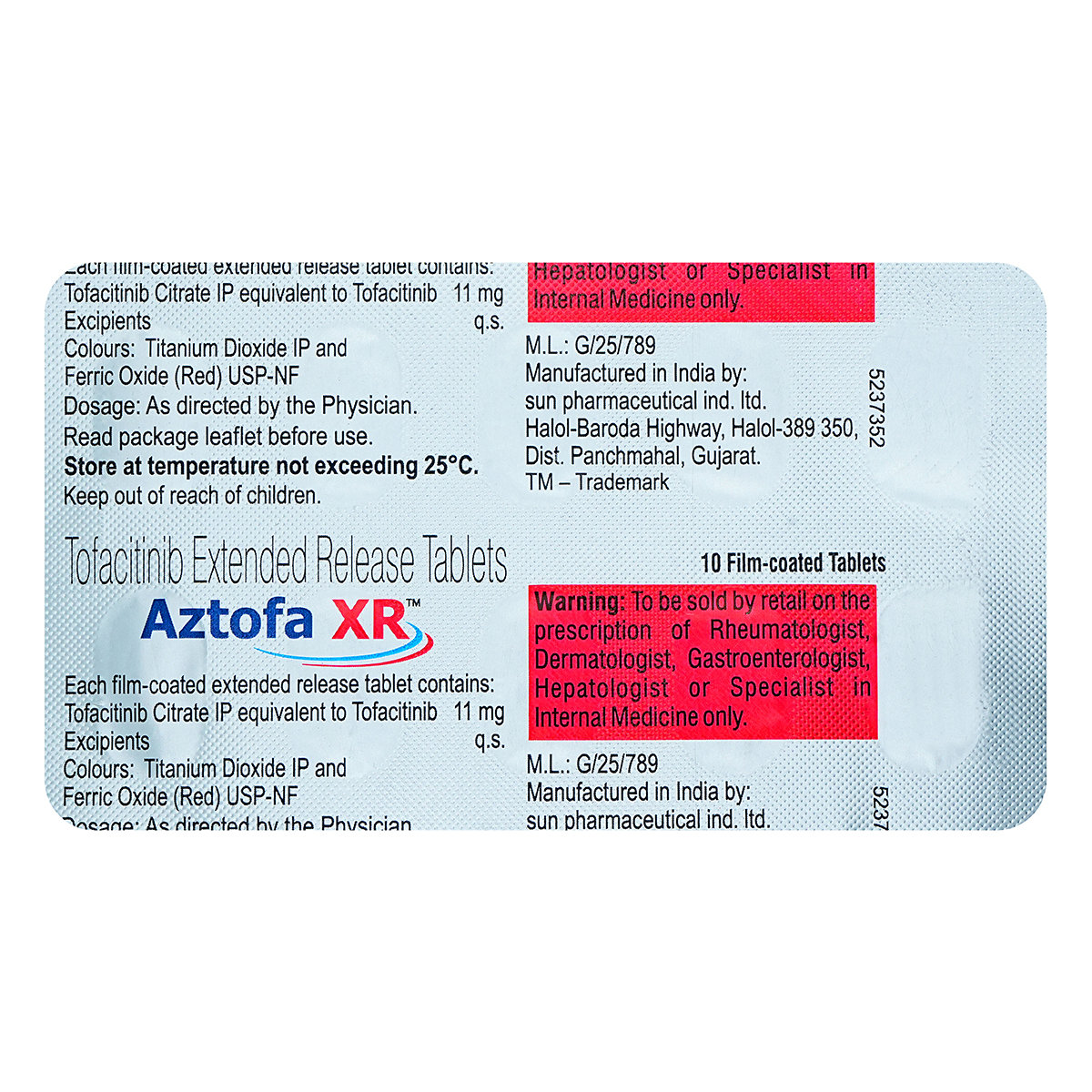
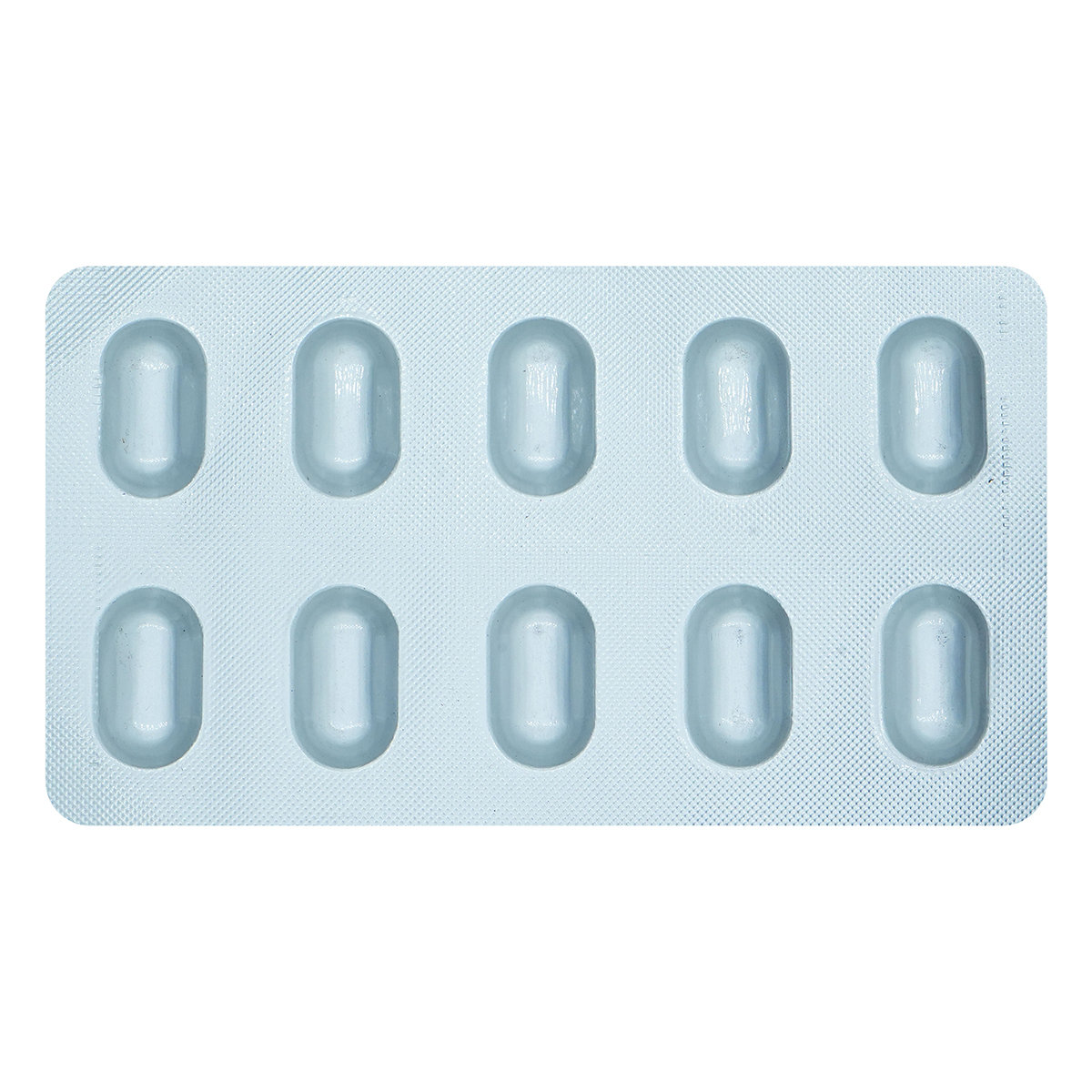



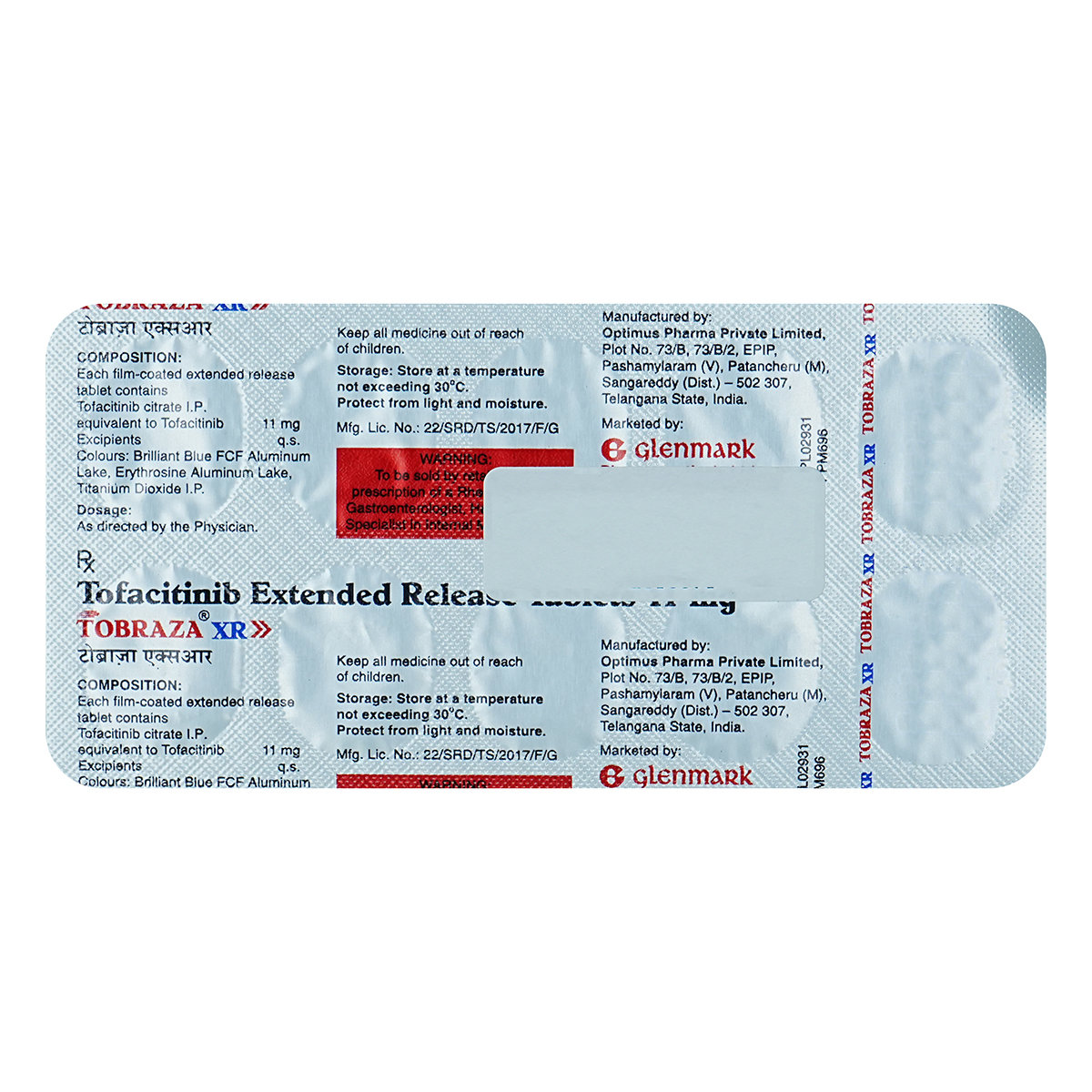




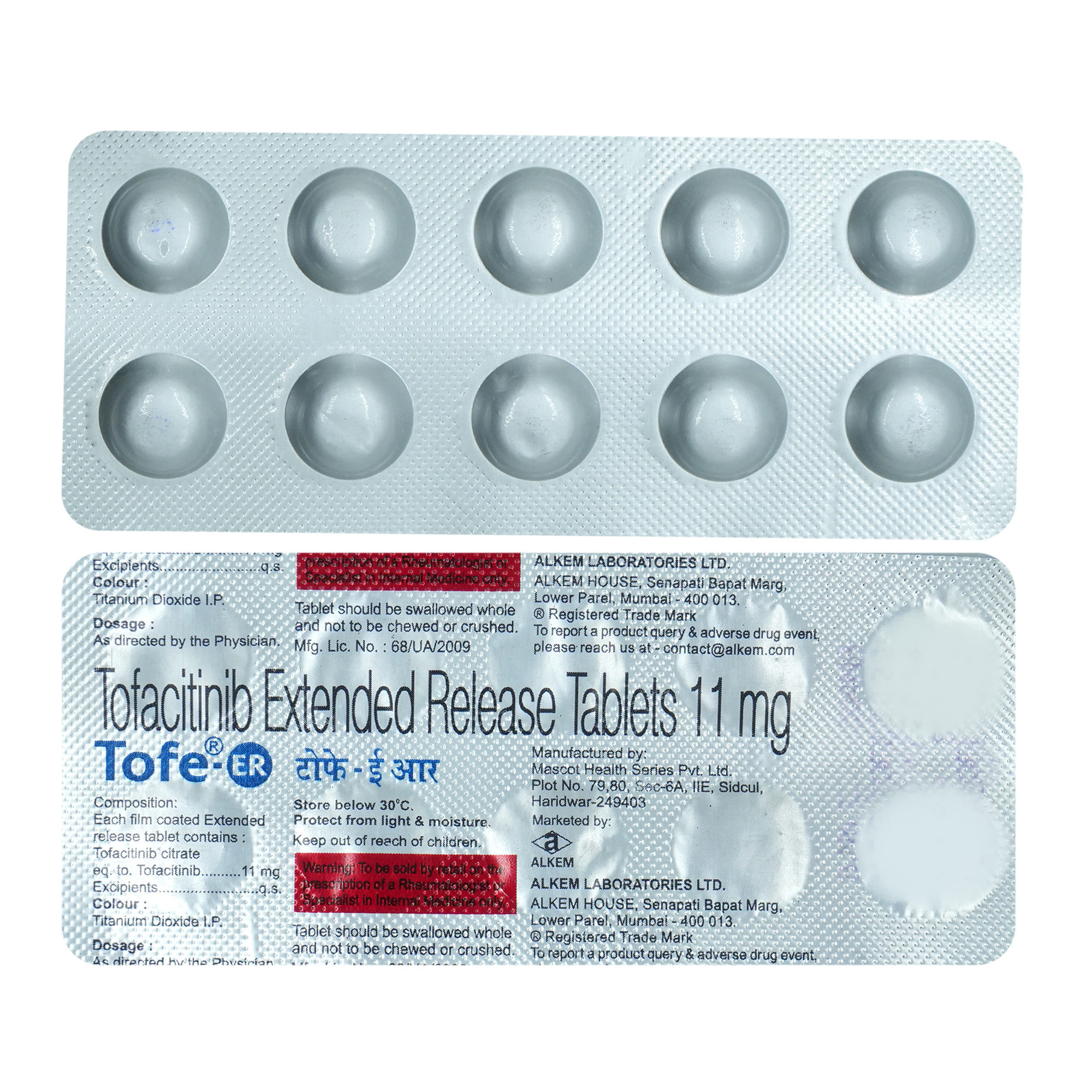
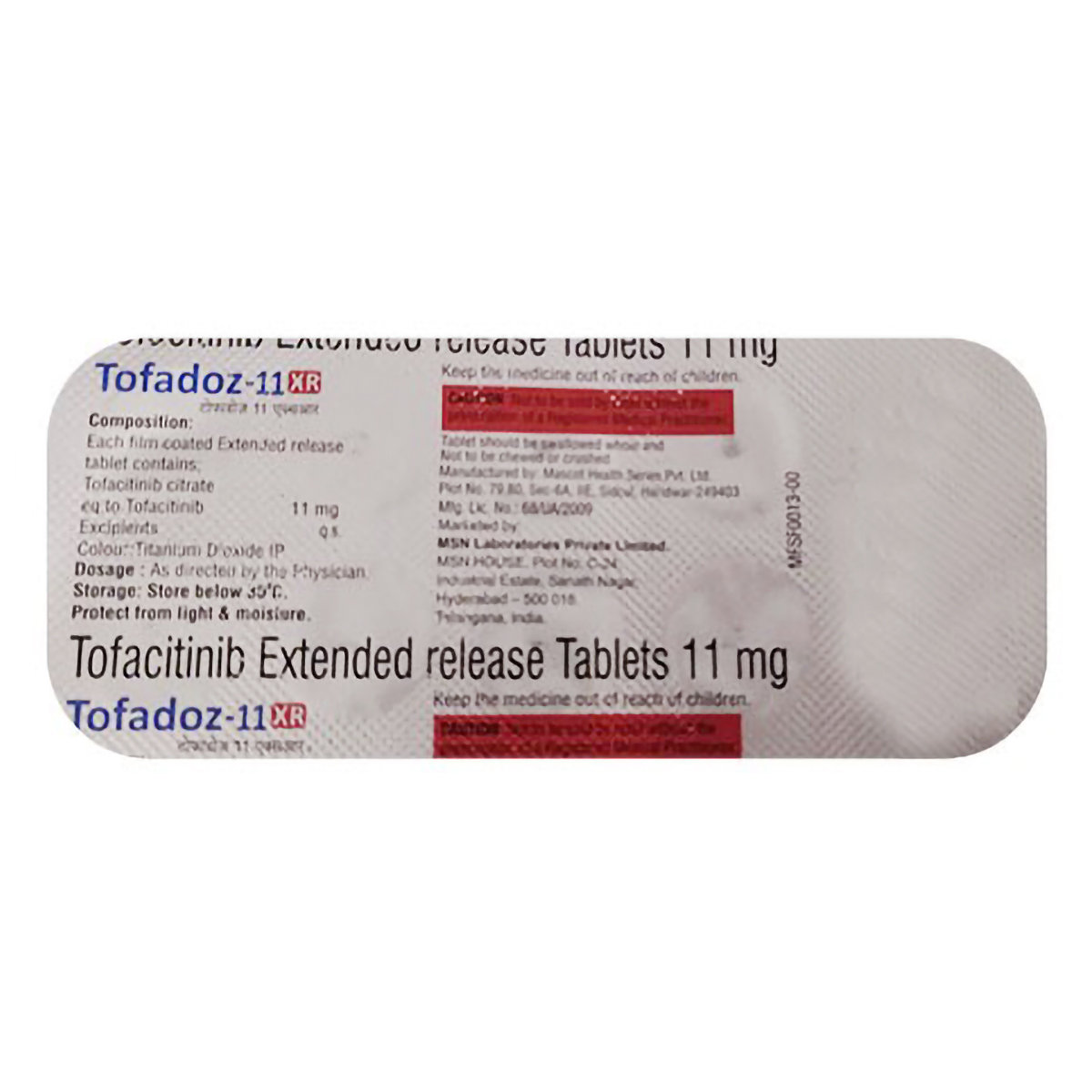

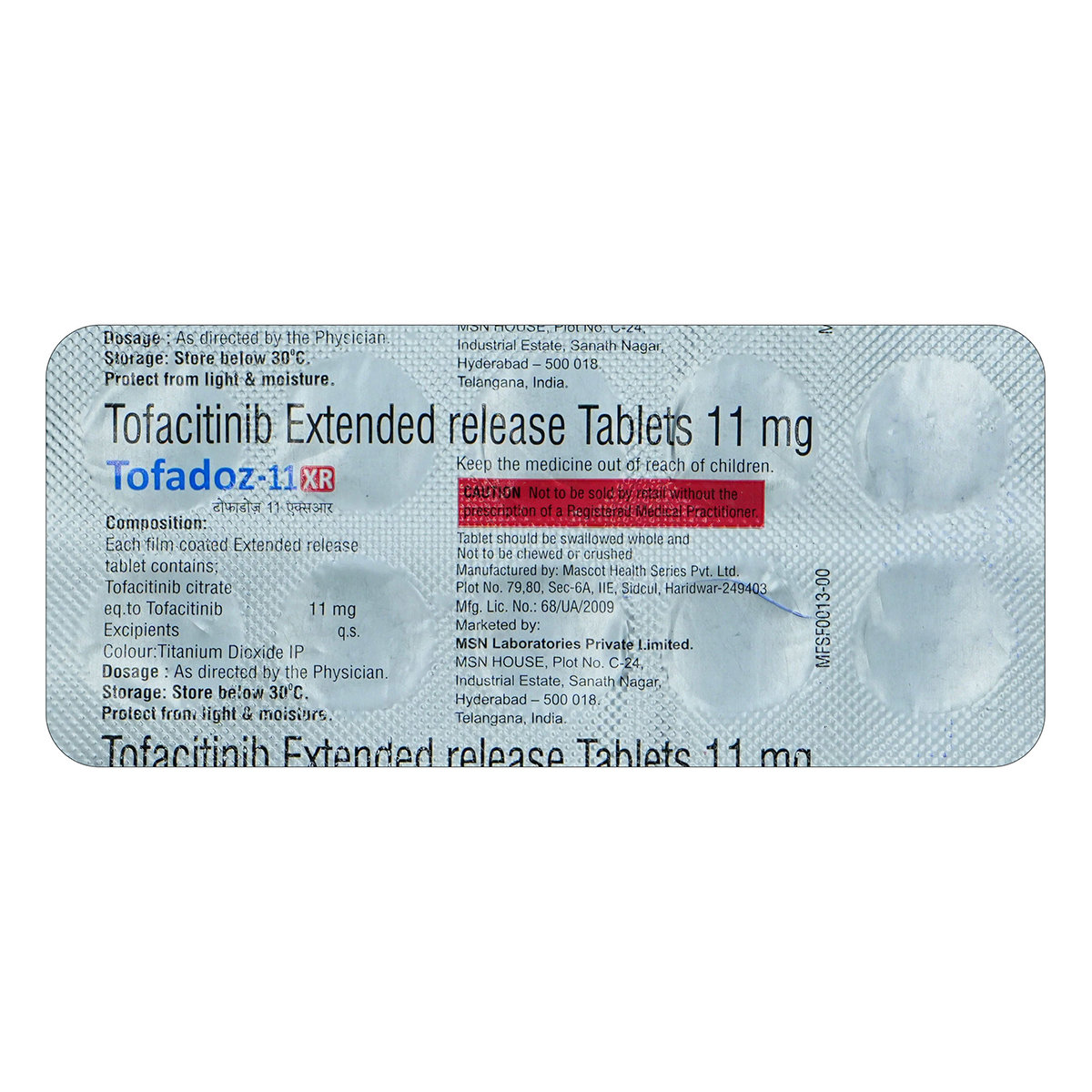
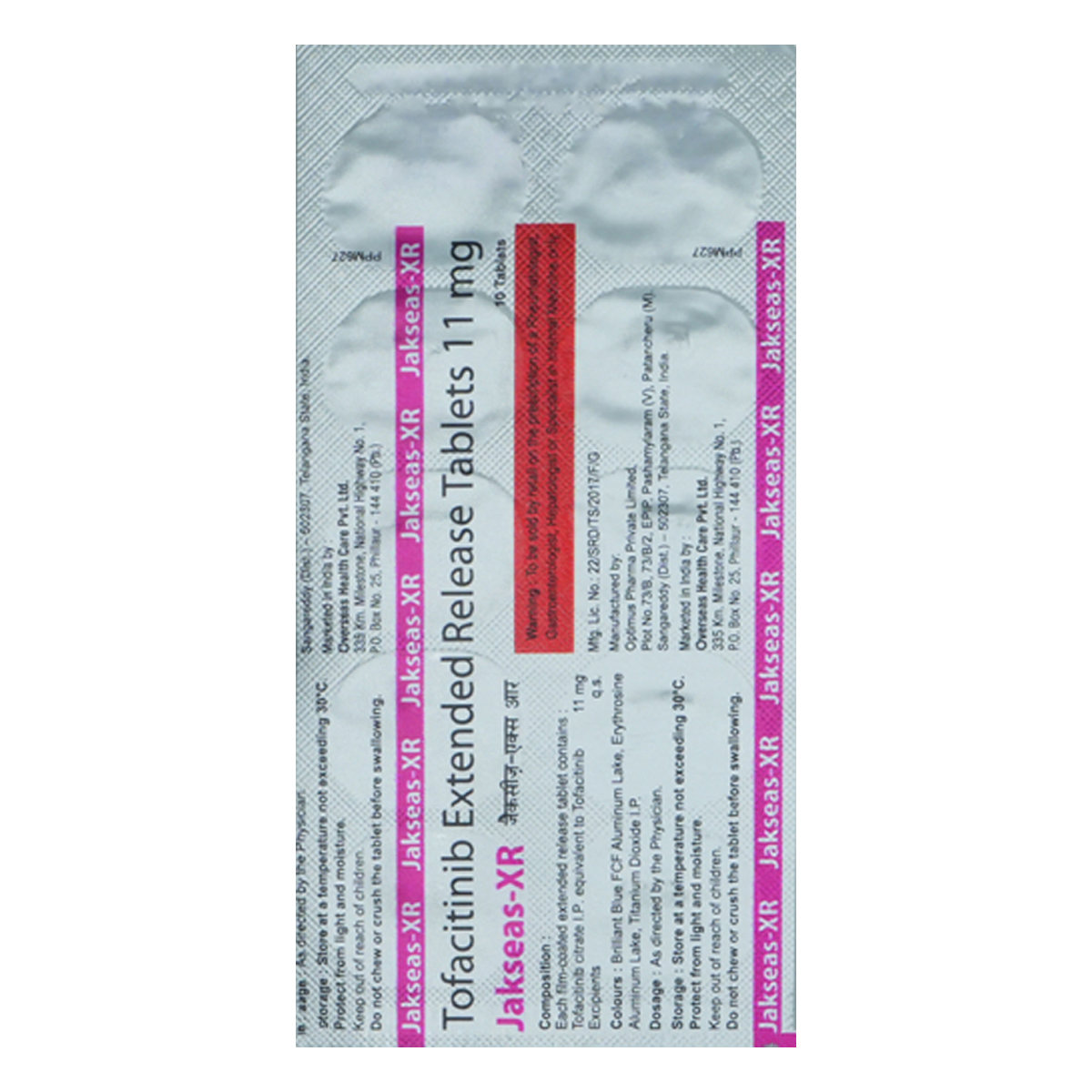
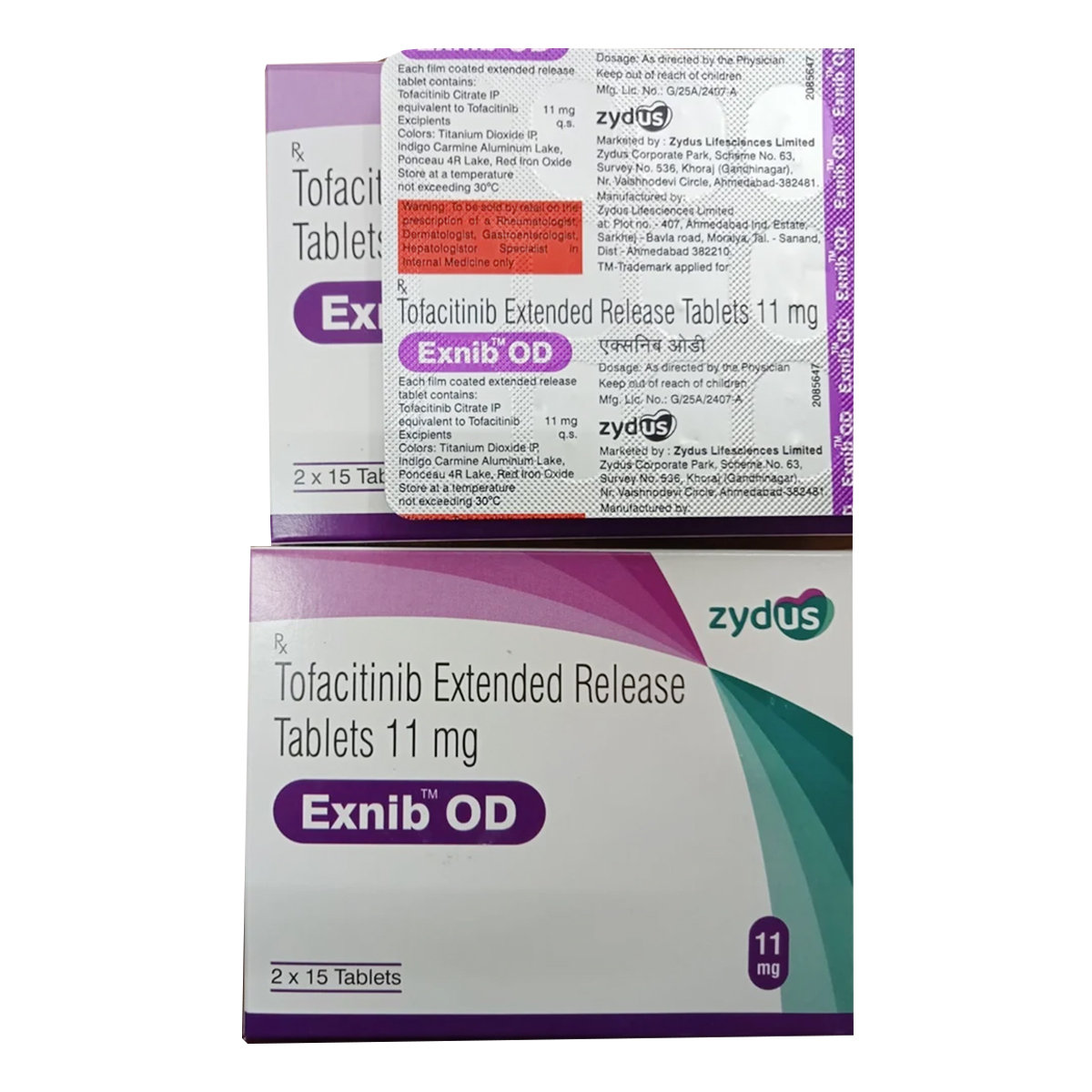

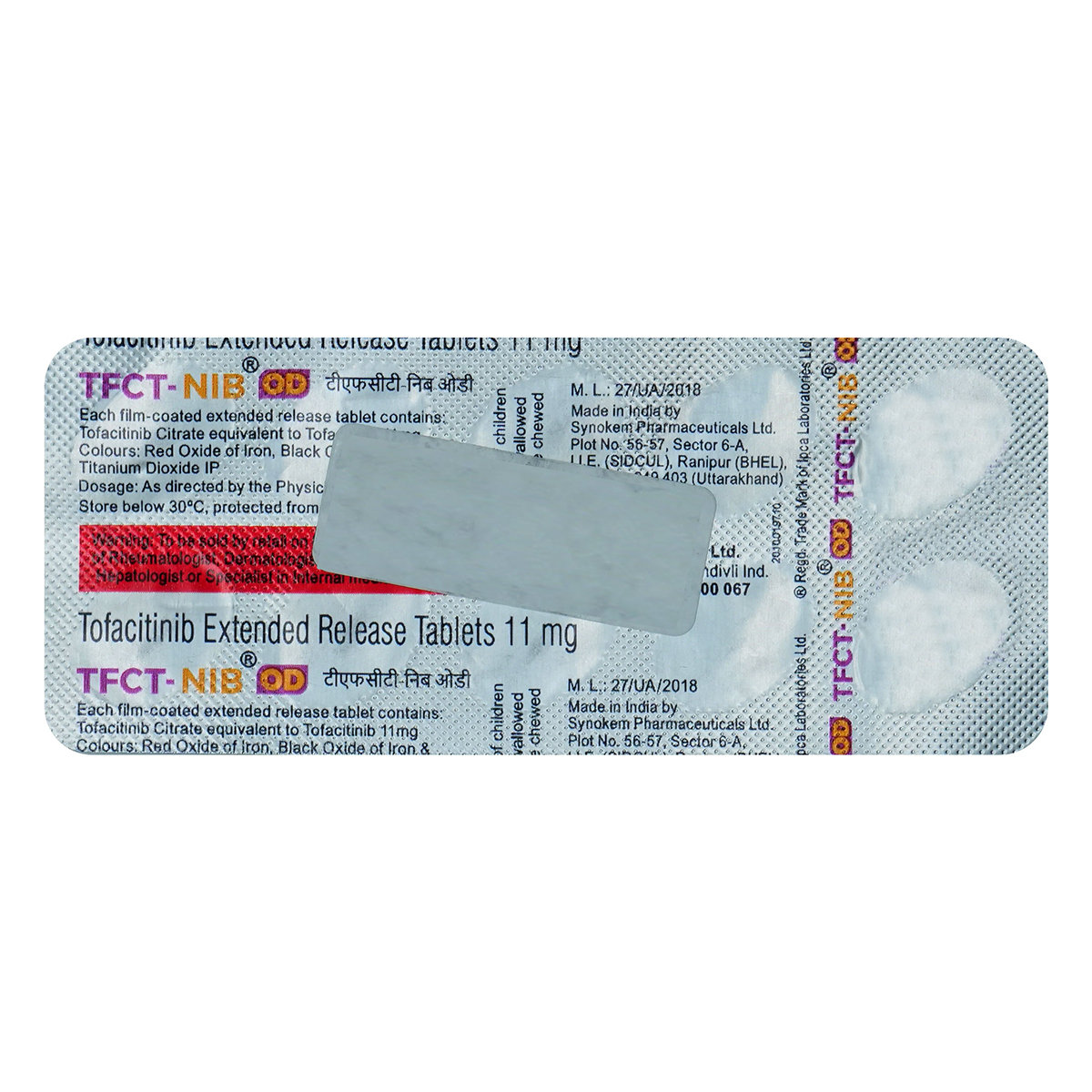
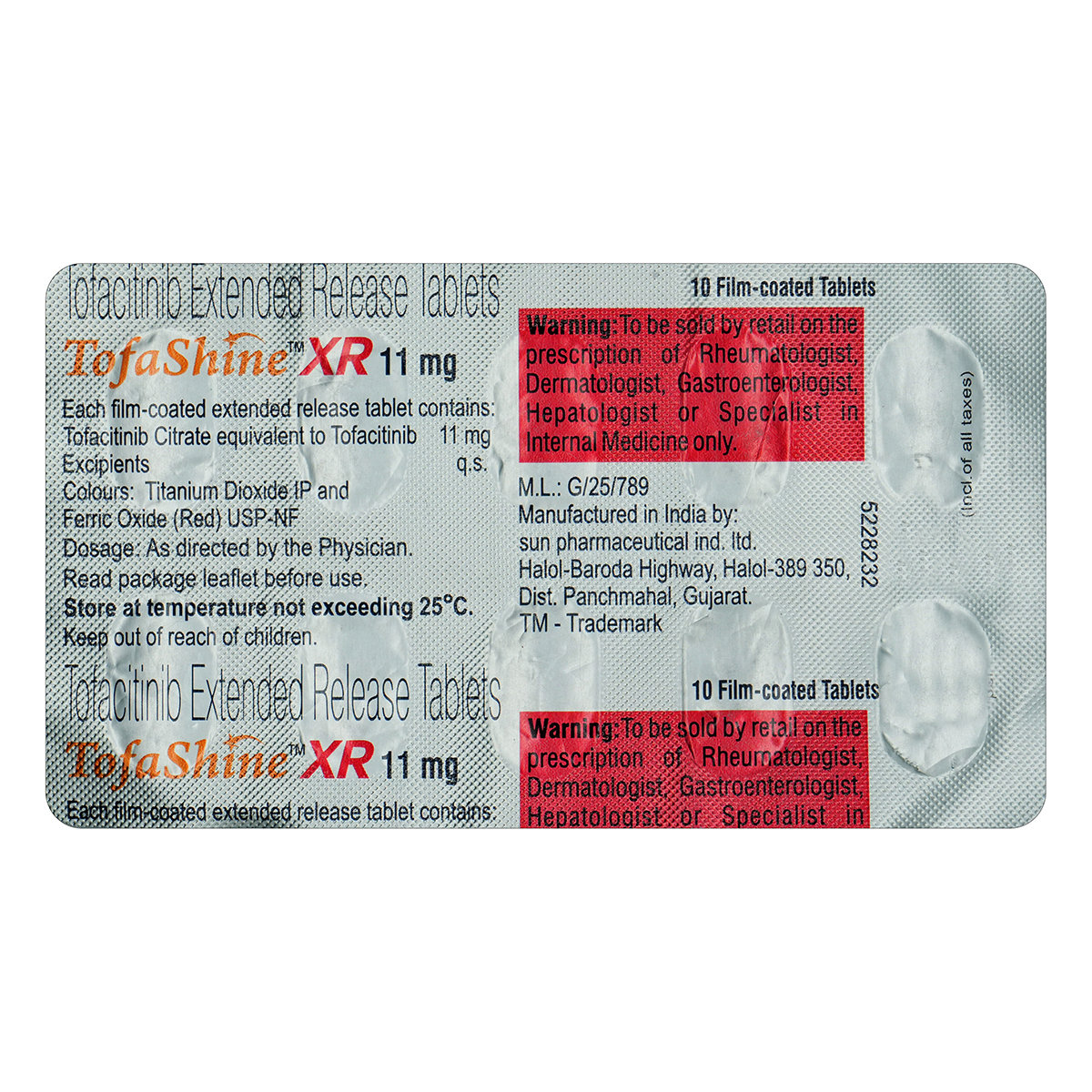

_0.jpg?tr=q-85)

